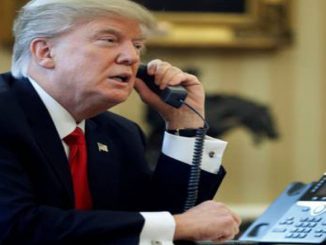
A bill that allows the families of victims of the 9/11 attacks to sue the country of Saudi Arabia for any role it may have played in the terrorist plot went into law Wednesday, declared media reports.
The new law applied after both the U.S. Senate and the U.S. House of Representatives voted to override President Obama’s veto of the bill the week prior.
The Senate voted 97-1, and the House of Representatives voted 348-77, to override the veto, that is the first Mr. Obama has faced in his presidency.
President Barack Obama called the override a “mistake”, saying he believes the law JASTA would severely complicate America’s business overseas, ‘potentially jeopardizing sovereign immunity for our own diplomats’.
He said this law would “neither protect Americans from terrorist attacks, nor improve the effectiveness of our response to such attacks”, he warned.
It is noteworthy that the family members of the terrorist attacks victims have pushed for such a measure for years, and they have pressured members of Congress to move ahead with the legislation in the days leading up to the 15th anniversary of the attacks.
So, would this new law -which is called Justice Against Sponsors of Terrorism Act “JASTA” and has been fiercely opposed by Saudi Arabia- be helpful for the US Administration?
The law which will allow families of victims to receive about $2 million each if they sue Saudi Arabia, might make U.S. personnel find themselves dragged into lawsuits abroad over American drone use in Pakistan and Afghanistan, or even its support for Israel, outlined analysts in Washington Post.
Defense Secretary Ashton B. Carter warned that ” allowing the bill to become law risked damaging America’s close and effective cooperation with other countries” and “could ultimately have a chilling effect on its own counter-terrorism efforts.”
But according to law’s supporters, JASTA would not bring about the grave consequences that Obama and other opponents of the legislation imagine.
New York Post said the bill has a very limited scope: It only applies to foreign governments that support terror attacks on US soil, adding that ‘even if foreign governments created similar retaliatory laws, they wouldn’t affect the United States because we don’t support terror attacks against innocent civilians’.
On the other hand, New Jersey GOP Rep. Chris Smith told CNN that “The President chose the King and vetoed the bill and we can correct that here today.”
Sen. Tim Kaine of Virginia, the Democratic vice presidential candidate, was the only deputy who did not vote.
Former New York City Mayor Rudy Giuliani, on behalf of the Donald Trump campaign, said that the President’s veto “was an insult to the families of those we lost on 9/11, and I congratulate the Congress for righting that terrible wrong.”
Clinton has said publicly she supported the legislation, Jesse Lehrich, a Clinton spokesman. “She would sign this legislation if it came to her desk.
According to several analyses, Democrats voted to override Obama’s VETO, to avoid the risk of losing the presidency election, and fearing that Republicans may use Obama’s veto to show that the Democrats are against the families of Sept.11 ‘s victims.
Saudi Arabia Warns
Saudi Arabia and its allies are warning that U.S. legislation allowing the Kingdom to be sued for the 9/11 attacks will have negative repercussions.
The Associated Press reported that the Kingdom maintains an arsenal of tools to retaliate with, including curtailing official contacts, pulling billions of dollars from the U.S. economy, and persuading its close allies in the Gulf Cooperation Council to scale back counter terrorism cooperation, investments and U.S. access to important regional air bases.
“This should be clear to America and to the rest of the world: When one GCC state is targeted unfairly, the others stand around it,” said Abdulkhaleq Abdullah, an Emirati Gulf specialist and professor of political science at United Arab Emirates University.
Abdullah noted that if the bill is enacted into law, he expects the GCC will take action that is more assertive and independent of the U.S. in places like Yemen, Bahrain and Egypt.
“This is not just a threat. This is a reality,” he declared.
Following the Kingdom’s history with such similar issues, when Saudi Arabia wanted to pressure Qatar to limit its support for the Muslim Brotherhood group in Egypt, it spearheaded an unprecedented withdrawal of Gulf Arab ambassadors from Doha in 2014 and essentially isolated the tiny gas-rich nation within the GCC.
And when Sweden’s Foreign Minister Margot Wallstrom strongly criticized Saudi Arabia’s human rights record last year, the Kingdom unleashed a fierce diplomatic salvo that jolted Stockholm’s standing in the Arab world and threatened Swedish business interests in the Gulf. Sweden eventually backpedal, said Associated Press.
Although the voting on JASTA bill was before month and a half from the presidential election, Saudi Foreign Minister Adel al-Jubeir told reporters in June that the U.S. has the most to lose if JASTA is enacted.
Joseph Gagnon, a senior fellow at the Peterson Institute for International Economics, said estimates put the figure of official Saudi assets in the government at somewhere between $500 billion and $1 trillion when considering potential foreign bank deposits and offshore accounts.
The Kingdom had $96.5 billion in holdings of Treasury securities in August, according to the most recent number released by the Treasury Department. Saudi Arabia ranked 15th in its holdings of U.S. Treasury debt.
– Decline of Confidence
Despite reports that Riyadh threatened to pull billions of dollars from the U.S. economy if the bill becomes law, Saudi Foreign Minister Adel AL-Jubeir said the Kingdom has only warned that investor confidence in the U.S. could decline.
The U.S.-Saudi Business Council’s CEO and Chairman Ed Burton says business between the two countries will continue, though potential deals could be jeopardized by JASTA.
“No business community likes to see their sovereign nation basically assailed by another nation,” Burton said.
As one of the world’s largest oil exporters with the biggest economy in the Gulf, Saudi Arabia also has other business partners to choose from in Europe and Asia, said President and CEO of the National U.S.-Arab Chamber of Commerce David Hamod.
“America is no longer the only game in town,” he said and outlined “U.S.-Saudi relationship is “entering into a new phase,” in which ties will be mostly underpinned by arms sales, unlike during the era of warm relations under President George W. Bush.”
From his side, the Saudi analyst, Abdul Aziz bin Saqr said in his column published in “Okaz” newspaper, that The Kingdom has to develop a plan to deal with lawsuits that it might encounter in US courts, saying undoubtedly the next president will not begin his term conflicting with the Congress in order to defend the Kingdom.



